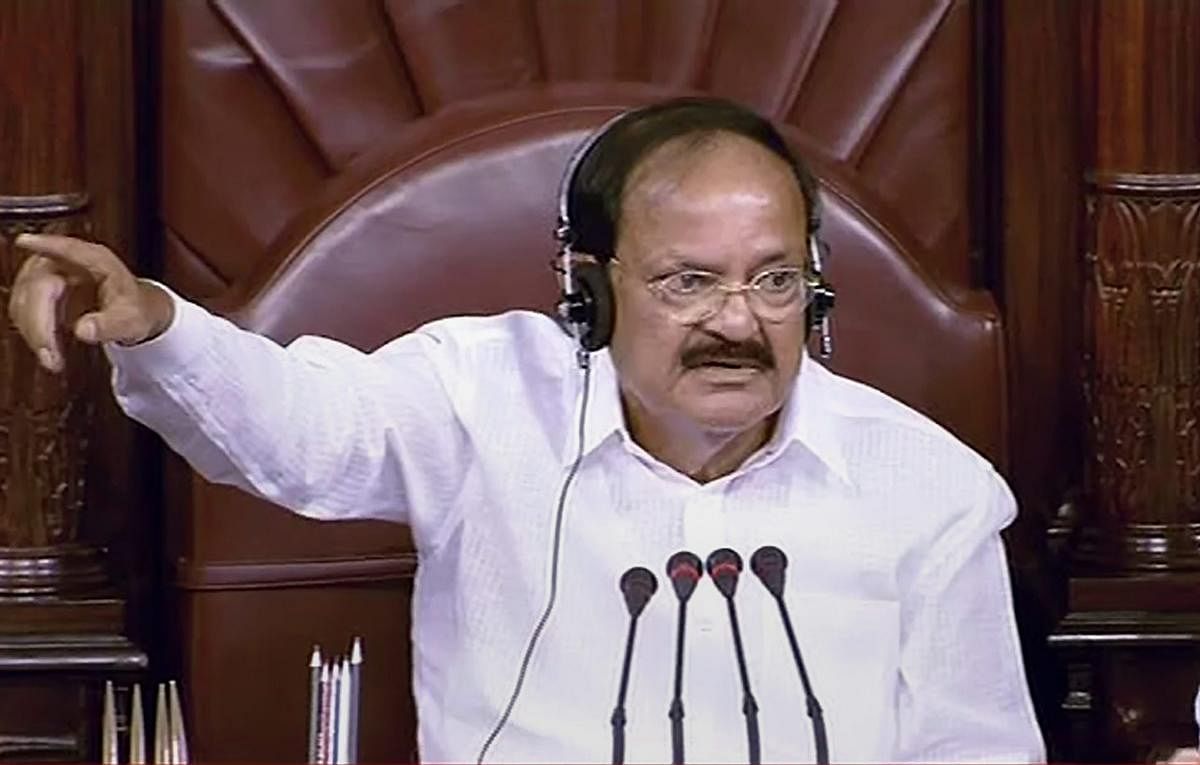
Rajya Sabha Chairman M Venkiah Naidu today asked whether the system had become "so helpless" in dealing with economic offenders, even as the opposition attacked the government for lack of will to act against the culprits despite having several laws.
As soon as Finance Minister Piyush Goyal moved the Fugitive Economic Offenders Bill in the Upper House for consideration and passing, Naidu remarked: "What is agitating the common man in the country is whether the system so helpless."
He said legal luminaries should shed light on this issue and urged the House for "meaningful suggestions", saying the people wanted to know if confiscation of property, criminal prosecution and bringing the accused back to India, will be possible.
The Chairman also observed that "the question people are asking is unless there is a treaty with different countries, how will it (accused fleeing the country) be checked."
The Fugitive Economic Offenders Bill aims at preventing culprits from evading the legal process and fleeing the country. It was passed by the Lok Sabha on July 19.
Soon thereafter, Congress member Vivek K Tankha attacked the government saying there was "no shortage of laws in India. But they get away because the government does not have the will to stop the willful defaulters."
"Is the government's intention to get a lot of publicity by bringing the law", he said, intiating the debate and added that the country will become a "land of legislations" but these "will serve no purpose."
Tankha said only 10 per cent of black money was outside India and wanted to know what the government has done to get back the 90 per cent of the black money within the country.
"Why is the government pitching for a threshold of offences worth Rs 100 crore for bringing economic offenders under the purview of the legisalation," he said, adding "even offender of Rs 10 crore is bad."
"People like Lalit Modi, Vijay Mallya, Mehul Choksi and Nirav Modi" were involved in economic offences worth Rs 2.4 lakh crore, he said. "Law is too little and too late as all big fishes are outside the country."
"Are we a country that make too many laws with little implementation," he said and added the real test would be if any fugitive would come back.
The Finance Minister, while moving the bill, said the instances of people escaping and evading the legal process was increasing which needed to be checked as the current laws do not allow to deal with the severity of problem and the "criminal law does not allow us to impound their property."
"This bill is an effective, expeditious and constitutional way to stop these offenders from running away. Legislative changes or a new law must be in place to confiscate assets of such absconders from running away.
"Legislative changes or a new law must be in place to confiscate assets of such absconders till they don't present themselves in front of couts. We will also work out what has to be done with the confiscated assets," he said.
Goyal said the government will ensure that unless a person comes back, he cannot try and stall confiscation of his property in the garb of civil cases.
He said there are provisions of special courts to declare a person a fugitive economic offender in an expeditious way.
Once a person is declared so, his property will be confiscated, managed and disposed of, he said, adding that offences involving funds over Rs 100 crore and above will be dealt with under this law to focus on larg cases.
Bhupender Yadav (BJP) quoted the White Paper released by the UPA government that black money cannot be dealt with without stringent laws.
He said there were 30 economic offenders between 2004 and 2014 who had fled the country, while the stressed assets of banks rose to Rs 52.15 lakh crore from 18.6 lakh crore.
He said money confiscated from such offenders can be used in construction of highways, schools and bridges.
While supporting the bill, Neeraj Shekhar (SP) however raised apprehensions on the implementation of the proposed legislation. He alleged that various economic offenders have left the country's shores with the active support of the government.
Pointing out that India had extradition treaties with only 47 countries, he asked how was the government planning to bring the offenders back to the country.
"Make laws which can be implented. How much black money has come back to the country in the last four years," he said.
A Navaneethakrishnan (AIADMK) asked the government to add provisions to increase quantum of punishmnet as well as fine for economic offenders.
Prasanna Acharya (BJD), while supporting the bill, said the proposed legislation needs to be legally sustainable. He also said the provision of Rs 100 crore to bring any offender under the ambit of the proposed bill should be removed.
Harivansh (JD-U) said it would be difficult to bring back offenders from various countries due to lack of extradition treaties with such nations.
Elamaram Kareem (CPI-M) said that so many economic offenders were able to leave the country due to the "neo- liberal" regime of the central government.
MV Rajeev Gowda (Cong) pointed out that the focus of the proposed lesgislation should be on preventing the economic offenders from leaving the country rather then bringing them later back to the country.
He also challenged the Finance minister and the government to bring back even one economic offender to India before 2019.